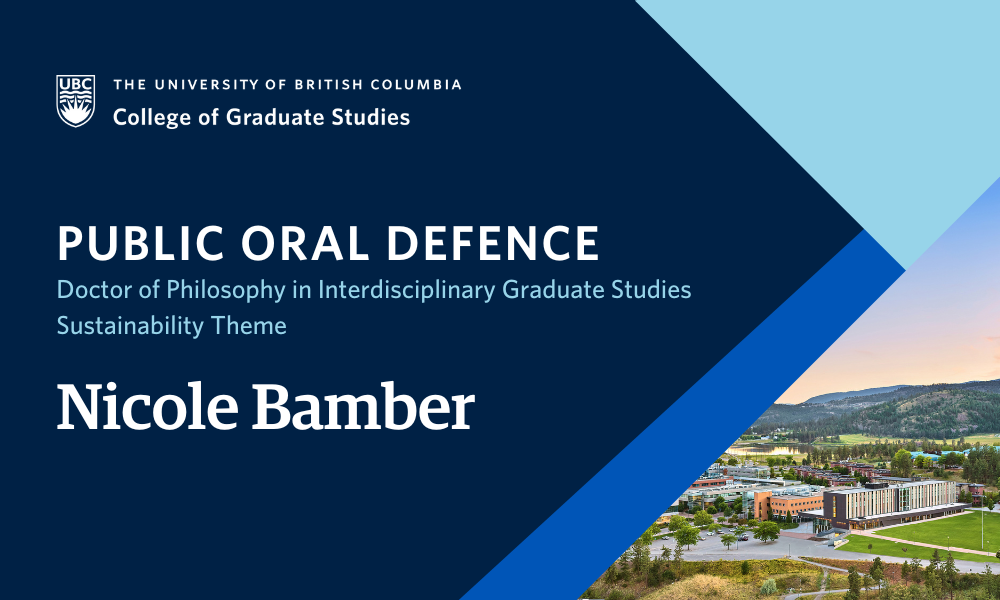
- This event has passed.
Dissertation Defence: Optimization of nutritional and environmental efficiency of Canadian field crop land use and product allocation using life cycle assessment
October 11, 2024 at 9:00 am - 1:00 pm

Nicole Bamber, supervised by Dr. Nathan Pelletier, will defend their dissertation titled “Optimization of nutritional and environmental efficiency of Canadian field cropland use and product allocation using life cycle assessment” in partial fulfillment of the requirements for the degree of Doctor of Philosophy in Interdisciplinary Graduate Studies – Sustainability theme.
An abstract for Nicole Bamber’s dissertation is included below.
Examinations are open to all members of the campus community as well as the general public. This examination will be offered in hybrid format. Registration is not required to attend in person; however, please email nathan.pelletier@ubc.ca to receive the Zoom link for this exam.
ABSTRACT
Global populations are rising, and many among us are currently not receiving adequate nutrition, in terms of both under and overnutrition for calories and specific nutrients. Obesity is a chronic disease with increasing prevalence, related to both overconsumption of calories, but also underconsumption of key nutrients. Food and nutrition insecurity is caused by a variety of issues such as economic access, and the inability to produce foods with adequate calories and/or nutrients. Moreover, agricultural land use has limited area for expansion, and already large environmental impacts. It is therefore of the utmost importance to design sustainable food systems that optimize the nutritional and environmental efficiency of agricultural land use and food production. Therefore the purpose of this dissertation was to propose an optimization framework to maximize nutrient provision and minimize environmental impacts associated with the production of specific food products.
A case study of canola, wheat and peas produced in Saskatchewan, Canada was selected, based on the importance and variability in use of the crops, and the suitability of this region to grow them. The baseline of human-edible food products produced from each crop (including plant-based foods and animal products from livestock fed each crop as feed) was estimated based on government and industry statistics. The environmental impacts associated with these foods were then estimated using life cycle assessment (LCA) – a systems-level sustainability assessment tool that is used to quantify the environmental impacts along the entire supply chain of a product. The nutritional contents (unitless combined nutrient score) and associated human health impacts (Disability Adjusted Life Years) of each food were also quantified. Finally, multi-objective optimization was performed to optimize land and product use for the case study crops for nutritional and environmental objectives.
It was generally optimal to maximize the amounts of each crop used for human consumption, and to only feed the non-human edible portions to animals. The optimal livestock proportions for this animal feed included a majority fed to broiler chickens, followed by layer hens and dairy cows, with beef cattle and pig production minimized. Using the optimized scenarios for foods produced from each crop, there were trade-offs between land use for each crop – canola generally provided the most beneficial nutrients (mostly omega-3 and -6 fatty acids), but with increased detrimental nutrients and environmental impacts, whereas peas had the lowest environmental impacts and detrimental nutrients, with lower levels of beneficial nutrients. In the future, this optimization framework can be used to assess different, larger, or more complex optimization questions. This can provide the basis for decision support towards a more sustainable food system.